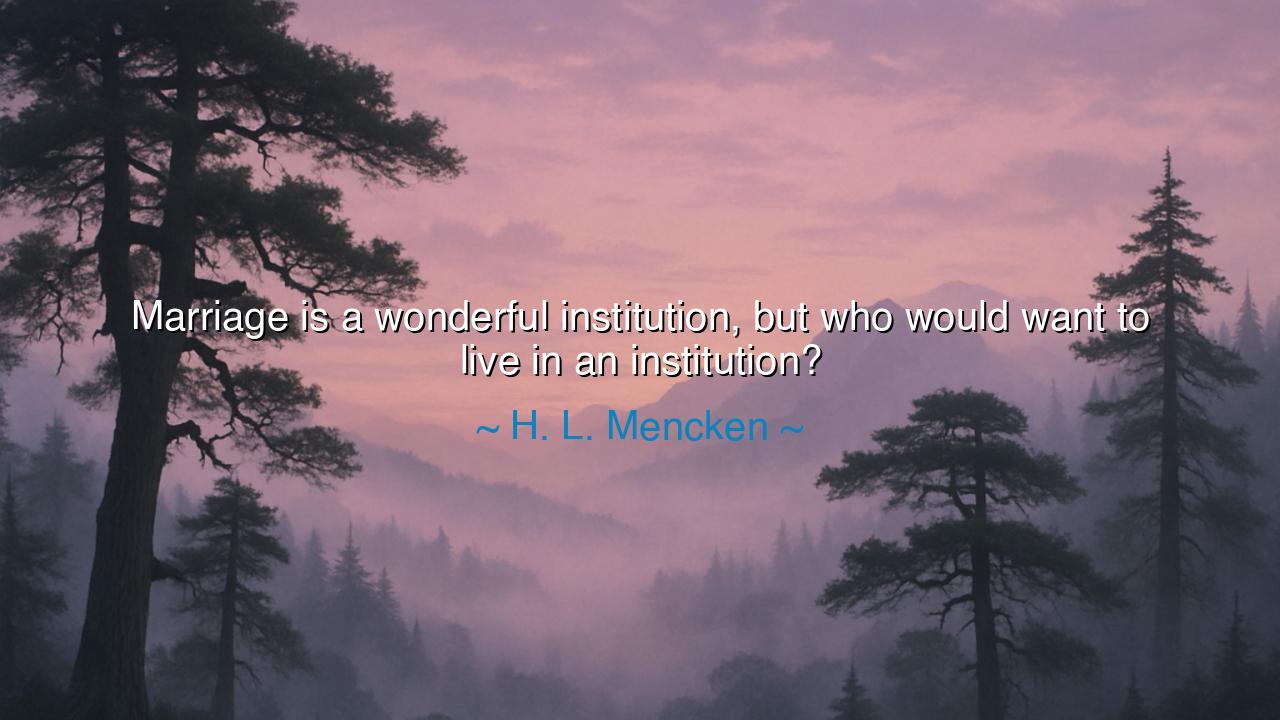
Marriage is a wonderful institution, but who would want to live






“Marriage is a wonderful institution, but who would want to live in an institution?” Thus spoke H. L. Mencken, the fierce satirist and philosopher of the early twentieth century, whose wit cut through the pretenses of society like a blade of laughter. His words shimmer with irony — half jest, half truth — revealing the paradox at the heart of one of humanity’s oldest bonds. In this single line, Mencken captures both the majesty and confinement of marriage, its beauty and its burden, its promise of unity and its peril of routine. It is a joke, yes — but beneath the jest lies a meditation on freedom, love, and the human spirit’s longing to belong without being bound.
In the ancient days, men and women did not speak of marriage as romance but as covenant — a sacred order, a bond not merely between two souls, but between families, gods, and generations. It was indeed an institution, something larger than the individuals who entered it. To marry was to step into a structure of duty, expectation, and continuity. And yet, as Mencken reminds us, there is a danger in such permanence — for institutions, though built for protection, can also become prisons if the spirit within them dies. What was meant to shelter can begin to confine; what was born of love can harden into law.
Mencken, ever the skeptic of social conventions, saw in marriage a reflection of society’s deeper hypocrisy: that people idealize commitment, yet so often lose themselves within it. His humor exposes this contradiction — that what begins as joy can too easily become habit, and habit, in turn, becomes constraint. In likening marriage to an institution, he does not condemn love, but warns against its ossification — against letting what is wild and alive be reduced to a system. For Mencken, true partnership should be a meeting of free spirits, not the caging of them.
Consider the story of John Stuart Mill and Harriet Taylor, two lovers of intellect and passion in the nineteenth century. Both rejected the rigid roles of marriage as their society defined them. For years, they refused to marry, fearing that the legal institution would destroy the equality of their bond — that the sacredness of their love would become subject to the laws of property and propriety. When they finally wed, they vowed to preserve their freedom within union, to love not because they must, but because they chose to, each day anew. Their story is a living echo of Mencken’s warning: that love should be a flame, not a chain — a force that expands the soul, not confines it.
Yet, Mencken’s wit does not despise marriage itself. When he calls it a “wonderful institution,” there is sincerity hidden in the mockery. He acknowledges the beauty of devotion, the courage it takes for two people to build a life together. But he also knows the fragility of the human heart — that routine can dull passion, that comfort can choke adventure. His jest reminds us that the glory of marriage lies not in its form, but in its spirit. When love becomes obligation and duty replaces desire, the institution loses its wonder. Thus, his question — “Who would want to live in an institution?” — is not rejection but challenge: to keep the union alive, not merely intact.
There is, then, a deeper wisdom in Mencken’s laughter. It is the reminder that freedom and love must walk hand in hand. To be joined to another is not to surrender oneself, but to find a mirror that reflects one’s freedom in fuller light. The danger lies not in marriage itself, but in the forgetting of this truth — in allowing the world’s expectations to overshadow the intimacy of two living souls. The walls of the institution need not imprison, if within them burns the fire of mutual respect, renewal, and play.
So, O seeker of wisdom, take Mencken’s words not as cynicism, but as counsel. Do not make your love a law; make it a living art. Enter no bond that suffocates your laughter, and keep no rule that stifles your joy. Whether in marriage or solitude, cherish the spirit of freedom that keeps the heart awake. Let the institution serve the love, not the love the institution. And when the world tells you to live by its systems, remember that life — like love — was never meant to be a cell, but a shared adventure beneath the open sky.
Thus, in Mencken’s humor lies the oldest truth: love thrives only when it breathes. Marriage may be a grand institution — but to truly live within it, one must never let the doors close too tightly, nor the laughter fade from its halls. For in the dance between closeness and independence lies the art of all enduring unions — and the joy that keeps the institution from becoming the cage.






AAdministratorAdministrator
Welcome, honored guests. Please leave a comment, we will respond soon